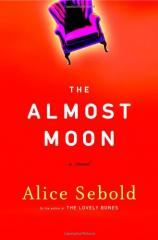Reading Group Guide
Discussion Questions
The Almost Moon

1. After the conversation with her father about "almost moons," Helen says, "I knew I was supposed to understand something from my father's explanation, but what I came away with was that, just as we were stuck with the moon, so too we were stuck with my mother" (page 134). What did Helen's father intend to say with his example of "almost moons"? Did you think his metaphor was apt?
2. The Almost Moon opens with a startling confession. After the first several pages, why did you think Helen killed her mother? Did you feel sympathy for her at that point? As you learned more about Helen's relationship with her mother -- and her mother's overall mental state -- did your feelings about Helen change? Did you think she was more justified to act as she did, or did you lose sympathy for her?
3. In chapters two through four and chapter eleven, Helen flashes back to memories from her past. In the first section, she is slowly removing her mother's clothes to bathe her. In the second, she is posing for art students. What do you think Sebold is implying about the relationship of the body to memory? Can you think of other instances in the text when the tactile leads Helen into a greater understanding or awareness of her past or that of another?
4. What motivated Daniel to stay with Clair for all those years? Do you think his bouts of depression stemmed from a difficult home situation, or did he have larger issues? Should he have taken his daughter and left his wife—for Helen's sake, if not for his own -- or did he do the right thing by taking care of his wife so that she wouldn't have to be in an institution? How much do we owe to those we love or have married?
5. What moves Helen to seek a physical connection with Hamish? Did you think their interaction was more than just physical? Was their relationship troubling to you, and was Natalie right to be angered by it?
6. Helen's two daughters, Emily and Sarah, are very different from each other, at one point reminding Helen of polarized magnets (page 80). Helen also tells Jake that "You left the girls. . . . I may not have been perfect, but I didn't take off. . . ." (page 167). Do you think Helen was a good mother? Was she a better mother to Sarah than to Emily? How do you feel her daughters would respond to that question?
7. In chapter nine, Helen seeks refuge with Mr. Forrest, who provides her an escape from her house. What is the significance to her of the illuminated manuscripts he collects? How does this visit change her view of her own life?
8. When they meet, Jake is Helen's teacher, and she is his muse. What causes them to drift apart and divorce? When he returns, how has their relationship changed?
9. In chapter twelve, Helen's father takes her to Lambeth, where he shows her the remains of his old house. What is the significance of the plywood people? Do they mean different things to Helen and to her father? Why does he select these particular moments of his life to commemorate? And does the town having been unsuccessfully "drowned" reflect any other situations in the novel?
10. How did you interpret the ending of the novel? What is the best way for Helen to make amends or atone for what she did? Or is there no way for her to make things right?
The Almost Moon
- Publication Date: October 16, 2007
- Hardcover: 304 pages
- Publisher: Little, Brown and Company
- ISBN-10: 0316677469
- ISBN-13: 9780316677462







